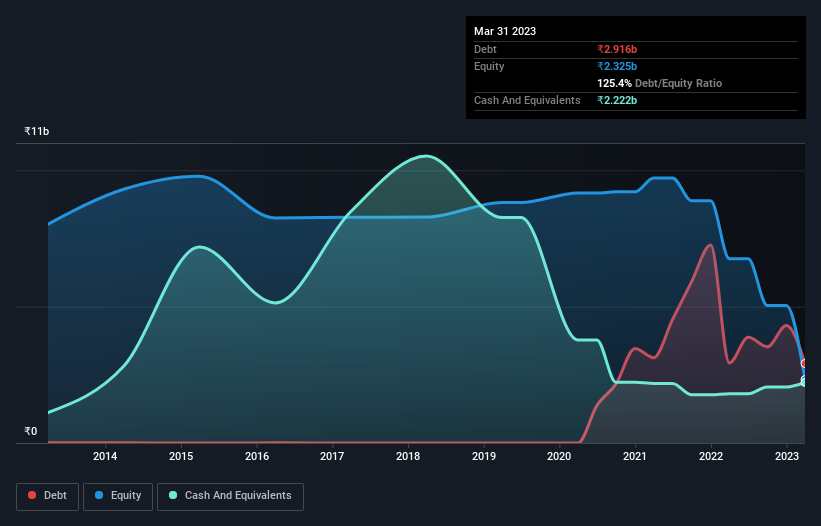
Howard Marks put it nicely when he said that, rather than worrying about share price volatility, 'The possibility of permanent loss is the risk I worry about... and every practical investor I know worries about.' When we think about how risky a company is, we always like to look at its use of debt, since debt overload can lead to ruin. Importantly, GE Power India Limited (NSE:GEPIL) does carry debt. But the real question is whether this debt is making the company risky.
When Is Debt A Problem?
Generally speaking, debt only becomes a real problem when a company can't easily pay it off, either by raising capital or with its own cash flow. If things get really bad, the lenders can take control of the business. While that is not too common, we often do see indebted companies permanently diluting shareholders because lenders force them to raise capital at a distressed price. Of course, plenty of companies use debt to fund growth, without any negative consequences. The first thing to do when considering how much debt a business uses is to look at its cash and debt together.
Check out our latest analysis for GE Power India
What Is GE Power India's Net Debt?
The chart below, which you can click on for greater detail, shows that GE Power India had ₹2.92b in debt in March 2023; about the same as the year before. On the flip side, it has ₹2.22b in cash leading to net debt of about ₹693.9m.

How Strong Is GE Power India's Balance Sheet?
We can see from the most recent balance sheet that GE Power India had liabilities of ₹24.5b falling due within a year, and liabilities of ₹1.82b due beyond that. Offsetting this, it had ₹2.22b in cash and ₹19.5b in receivables that were due within 12 months. So it has liabilities totalling ₹4.55b more than its cash and near-term receivables, combined.
While this might seem like a lot, it is not so bad since GE Power India has a market capitalization of ₹10.5b, and so it could probably strengthen its balance sheet by raising capital if it needed to. But it's clear that we should definitely closely examine whether it can manage its debt without dilution. When analysing debt levels, the balance sheet is the obvious place to start. But it is GE Power India's earnings that will influence how the balance sheet holds up in the future. So when considering debt, it's definitely worth looking at the earnings trend. Click here for an interactive snapshot.
In the last year GE Power India had a loss before interest and tax, and actually shrunk its revenue by 31%, to ₹18b. To be frank that doesn't bode well.
Caveat Emptor
Not only did GE Power India's revenue slip over the last twelve months, but it also produced negative earnings before interest and tax (EBIT). Its EBIT loss was a whopping ₹3.5b. Considering that alongside the liabilities mentioned above does not give us much confidence that company should be using so much debt. Quite frankly we think the balance sheet is far from match-fit, although it could be improved with time. For example, we would not want to see a repeat of last year's loss of ₹4.4b. So in short it's a really risky stock. The balance sheet is clearly the area to focus on when you are analysing debt. But ultimately, every company can contain risks that exist outside of the balance sheet. These risks can be hard to spot. Every company has them, and we've spotted 2 warning signs for GE Power India you should know about.
When all is said and done, sometimes its easier to focus on companies that don't even need debt. Readers can access a list of growth stocks with zero net debt 100% free, right now.
New: Manage All Your Stock Portfolios in One Place
We've created the ultimate portfolio companion for stock investors, and it's free.
• Connect an unlimited number of Portfolios and see your total in one currency
• Be alerted to new Warning Signs or Risks via email or mobile
• Track the Fair Value of your stocks
Have feedback on this article? Concerned about the content? Get in touch with us directly. Alternatively, email editorial-team (at) simplywallst.com.
This article by Simply Wall St is general in nature. We provide commentary based on historical data and analyst forecasts only using an unbiased methodology and our articles are not intended to be financial advice. It does not constitute a recommendation to buy or sell any stock, and does not take account of your objectives, or your financial situation. We aim to bring you long-term focused analysis driven by fundamental data. Note that our analysis may not factor in the latest price-sensitive company announcements or qualitative material. Simply Wall St has no position in any stocks mentioned.
About NSEI:GEPIL
GE Power India
Engages in the engineering, procurement, manufacturing, construction, maintenance, and servicing of power plants and power equipment in India and internationally.
Excellent balance sheet and good value.
Similar Companies
Market Insights
Community Narratives



